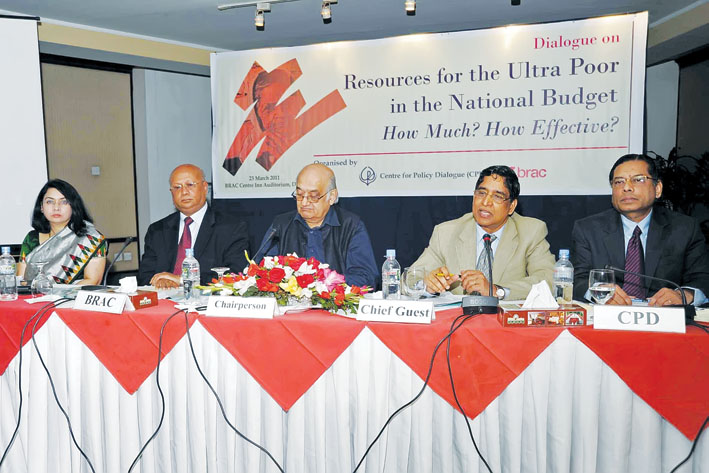“We seem to be spending over 50 per cent of our national budget for alleviation of poverty, but the reduction in the rate of poverty has not been happening at a fast enough pace,” said Professor Rehman Sobhan while chairing the CPD-BRAC dialogue on Resources for the Ultra Poor in the National Budget: How Much? How Effective? The dialogue was held on 23 March 2011, at the BRAC Centre Inn Auditorium where Hon’ble Minister for Food, Disaster Management and Relief Dr Muhammad Abdur Razzaque, MP was present as the Chief Guest. Dr M M Akash, Department of Economics, University of Dhaka and Dr Mustafa K Mujeri, Director General, BIDS were present as Designated Discussants of the event.
Professor Sobhan stated that poverty reduction should be the first area of accountability of the government. He noted that the ‘charter to change’ of the government would not be fully successful by solely expanding Social Safety Net Programmes (SSNPs) without proper utilisation of the allocated funds for poverty reduction.
A keynote paper titled An Analysis of the National Budget: Allocation for the Ultra Poor was presented by Dr Fahmida Khatun, Head of Research, CPD. The analysis stated that 84 SSNPs under four categories are now being implemented across the country to support the poor. The budgetary allocation for the SSNPs increased to 14.8 per cent of the total budget in FY2010-11 from 8.4 per cent in FY2006-07. “Still a meager proportion of the extreme poor are covered by SSNPs,” she remarked. As the ‘ultra poor’ is not a distinct group in the government’s policy documents, it becomes difficult to come up with a number to indicate how much resource is exactly allocated for the extreme poor. For this reason, the services under SSNPs should be improved and strengthened to support the poor and the extreme poor, suggests the CPD study. Access to SSNPs should be highlighted as the ‘right’ of the poor rather than ‘relief’, CPD recommended.
Dr Akash observed that due to lack of governance and political problems, there has been more wasteful expenditure and leakage in the SSNPs. He suggested to adopt participatory approach in targeting beneficiaries. Dr Mujeri said that endowment for the ultra poor has to be increased and policies should also address the issues to ensure their welfare. He also emphasised the need for qualitative change in the budget to address poverty. BRAC Executive Director Dr Mahabub Hossain also urged the government to make effective allocation for SSNPs by avoiding misuse and to take steps to turn ‘relief’ into ‘development’.
From the floor, Dr A B Mirza Azizul Islam, Former Adviser to the Caretaker Government remarked that the government runs many small and large programmes under the SSNPs which might be consolidated through an appropriate policy to mitigate such problems as multiplicity, mistargeting of right beneficiaries and misappropriation. Planning Commission Member Dr Shamsul Alam put emphasis on ensuring quality education to increase capacity of the ‘ultra or extreme’ poor for enhancing their income opportunities. He said that SSNPs are not sustainable initiatives, only education can help the poor to develop confidence and become financially solvent.
Hon’ble Minister Dr Razzaque mentioned that the contribution of revenue to the country’s GDP for poverty alleviation is low compared to other South Asian countries. He stressed the need to strengthen the capacities of the local government, and at the same time, to ensure accountability of the local government institutions so that the SSNPs are properly implemented for poverty reduction at the grassroot level. He admitted that there are cases of pilferages and leakages due to wrong selection of beneficiaries. “But the government is trying to make the selection process more transparent,” the Minister added.




